
Hazelle
in Memos & Musings · 8 min read
Lots of new investors have gotten used to the market headed up one way especially for those who have just gotten started the last few years. During this current meltdown, it is understandable that we see some element of panic for these retail investors.
As such they are looking for what could have saved or improved their current situation and naturally, commodities have come to appear as a bright spot to add to any multi-asset portfolio.
For some investors, commodities are known to be generally lower risk and possess correlation benefits (when the stock markets are down, commodities are up).
In this blog post, we will share with you what commodity investing is and our thoughts on commodities investing if they should have a place in your portfolio (those who have been following us in our community should have guessed the answer!).
First, what are commodities?
Commodities are basically raw materials used to create the products consumers buy. This includes food or agricultural products such as wheat and cattle, energy products such as oil and natural gas, and metals such as gold, silver and aluminum.
Over the last century, the demand for standardized contracts for trading agricultural products have led to the development of commodity futures exchanges. Today, futures and options contracts can be traded on exchanges around the world on a huge array of agricultural products, metals or energy products. Commodities have since evolved into an asset class itself since the 1990s.
Fast forward to today, investors can choose to invest in the commodities futures markets, with mutual funds or exchange-traded funds on single commodity exposures to sector based and broad based commodity exposures.
What is in it for investors to have commodities to be allocated to their portfolio?
Commodities is a distinct asset class with returns that are largely independent of stock and bond returns. Therefore, adding broad commodity exposure can logically help diversify a portfolio of stocks and bonds.
1. To hedge against inflation
Commodities are one of the few asset classes that tend to benefit from rising inflation. As demand for goods and services increases, the price of those goods and services usually rises, as do the prices of the commodities used as inputs to produce those goods and services.
In our current situation, the supply disruptions of commodities from Russia and Ukraine has driven up the commodity prices leading to inflationary pressures for the goods and services that consumers consume.
As commodity prices usually rise when inflation is accelerating, investing in commodities should then provide portfolios with a hedge against inflation.
2. Diversification benefits
Diversification of asset classes usually results in less wild swings in portfolio returns. Stocks and bonds tend to perform better when the rate of inflation is stable or slowing. With a high inflation environment, it lowers the value of future cash flows paid by stocks and bonds because that future cash will be able to buy fewer goods and services than they would today with prices of commodities increasing. Hence the pullback in stocks performance will thus be cushioned by the rise of commodities outperformance and lead to a lower volatility in the portfolio performance.
3. Future upside potential
Although commodity markets have been around for centuries, investors’ interest in them has always been quite limited. Over the last few years, things have turned around. Commodities have gained traction and investment in commodities is growing at an unprecedented rate. It is estimated that over the past few years (institutional) investors have poured over US$70 billion into commodities and many institutions expect to significantly increase their exposure into commodities further. Given the insatiable demand for commodities, it seems that we are just getting started only.
These 3 reasons are some of the key ideas that are thrown around on why you should have commodities in your portfolio. It may look like a no-brainer to do so especially with commodities picking up at a great pace earlier this year. So should we invest in commodities? In our opinion, probably not.
Why we don't like to invest in commodities
1. Commodities are complicated products
First of all, some retail investors have a misconception that commodities are easy to understand because they know what gold, oil or wheat are. They believe it is easy to see when the world needs more of something just like in the current climate of the Russia-Ukraine war. This cannot be further from the truth.
Typically commodities may involve futures contracts where an investor has to put up a sum of money to open a position. And most often than not, investors who are not experienced with using margin can have their account wiped out quite easily in a few bad trades.
The supply and demand relationships in commodity markets are extremely complex and completely different for different markets. To become a true expert in only one or two of the commodity markets like oil, agriculture, copper, gold or coffee etc. takes a lifetime of study. And even the experts are known to get it very wrong at times. Their value highly depends on the supply and demand forces of the asset. Inflation, while valid, is just one of the many factors.
Commodities themselves are unpredictable by their very nature. The demand and supply forces can take a turn all of a sudden. Weather conditions may deteriorate or harvest can go bad. The government policies may change. The costs of storage and transportation of commodities can vary. With technological advances in storage or transportation methods, we would perhaps expect commodity prices to fall or stay flat over the long term rather than to increase overtime as well. Just to name a few.
Owning a commodity essentially involves no earnings or cash flow and is simply a bet on production and/or consumption at that time. In short, any position in commodities is therefore a more speculative bet on the short-term future, rather than long-term growth which is usually associated for stocks or bonds. A ton of metal can still be a ton of copper metal from now, and it pays no dividends or interest.
This is unlike traditional stocks where for example, if the company makes more and more money, the intrinsic value of the stock rises and there is a basis for the stock price to continue moving up. It is relatively expected and predictable over the long term that fundamentally sound stocks will do well. Good earnings eventually drive good returns.
2. No solid track record
A picture speaks a thousand words. No matter how good or bad someone mentions something, at the end of the day their historical performance says it all. While good performance in the past may not be indicative of future performance, I would like to think that if I don’t even see anything fantastic historically, I would have better things to invest on. Let us take a look at the chart performance of commodities.
A possible way to get exposure to commodities would be through an ETF such as the Invesco DB Commodity Index Tracking Fund, ticker DBC which tracks the broad commodities market. Rank based on total assets, the top 3 commodities ETFs include PDBC and FTGC. Being commodities based, they generally have the same shape for their price chart and for simplicity purposes, let’s use the best performing in this case which is DBC ETF.


Performance of DBC, PDBC, FTGC ETFs as at 1 Jul 2022
Plotted against the S&P 500 which is in orange, we can see that it appears smart to call for commodities buying after the start of the Ukraine war and inflation issues start to surface. At one point DBC was up close to 50% YTD while S&P 500 was down by more than 20%. No doubt these are possible push factors that drive up the prices of commodities at this juncture.
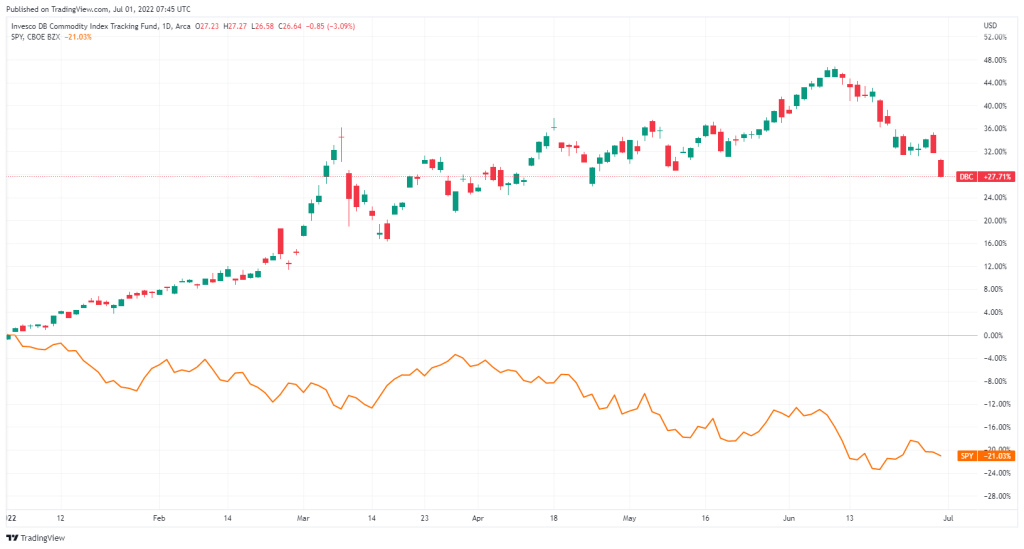

Performance of DBC and SPY for 2022
The truth of the matter is that the chart is what it is. It doesn’t tell you where the majority of the investors bought into commodities, unless you know how to look at it. Chances are most of the investors would not have gotten into commodities until sometime in March or April this year which is not the most favorable price to get in by then.
A simple way would be to look at when such articles or videos calling for commodities investing are published and you would know when the purchases are likely to have been made.
As a long term investor, let us also look at the last 10 year performances between commodities and the S&P 500.
Even as we are facing one of the worst starts for the S&P 500, we are still up by about 200% for S&P 500 whereas for DBC ETF, we are hovering near the breakeven point.
Can you imagine investing in something that makes nothing for 10 years?
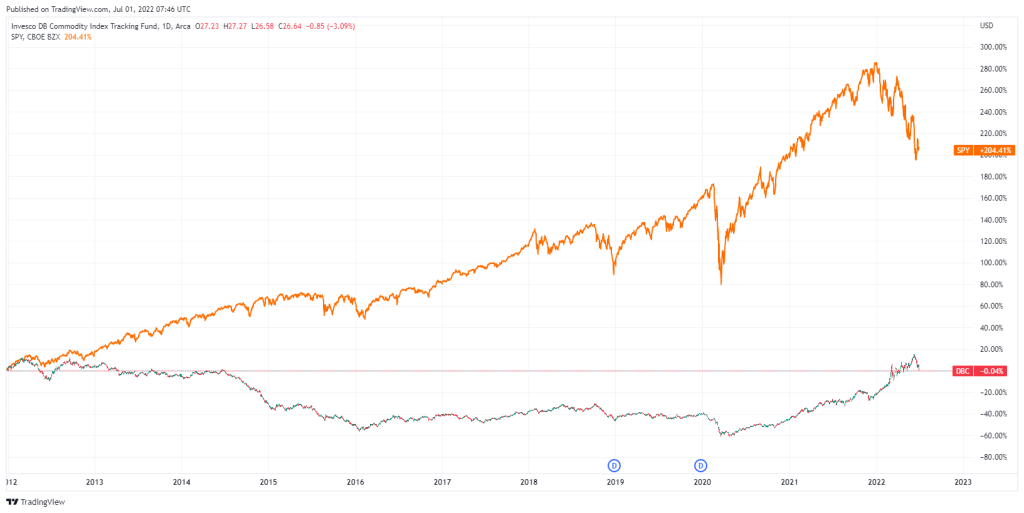

Performance of DBC and SPY over the last 10 years
As for the other 2 commodities ETF, after ten years they are still bleeding between 10%-30% approximately. Commodities are not a productive asset and do not give dividends. If the price doesn’t increase, one would have been wasting 10 years of his time.
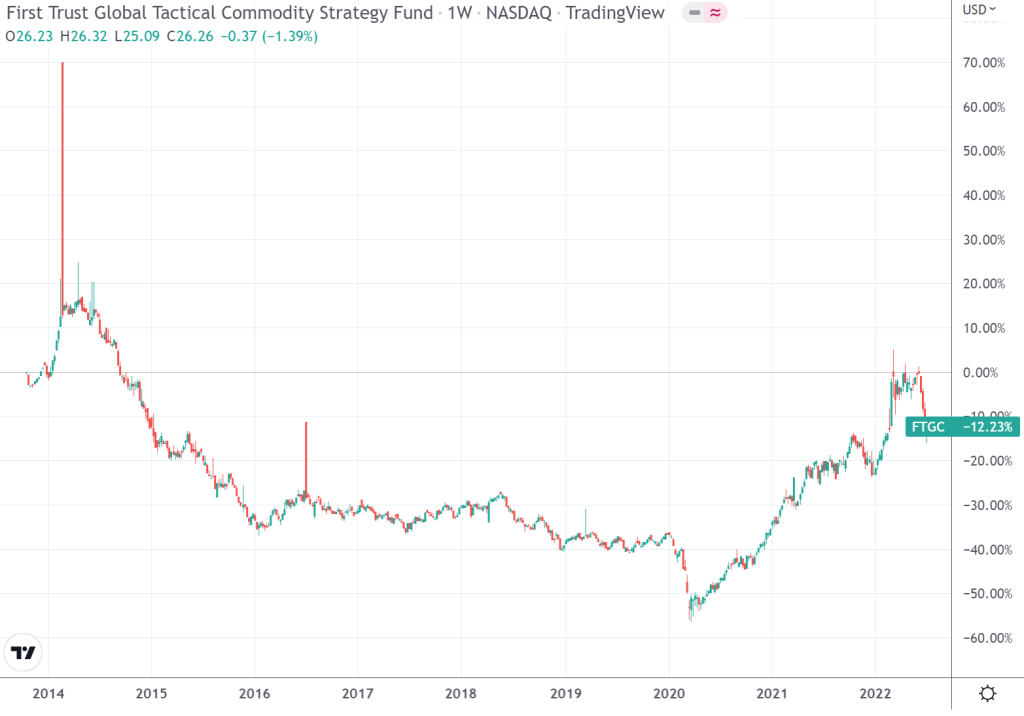

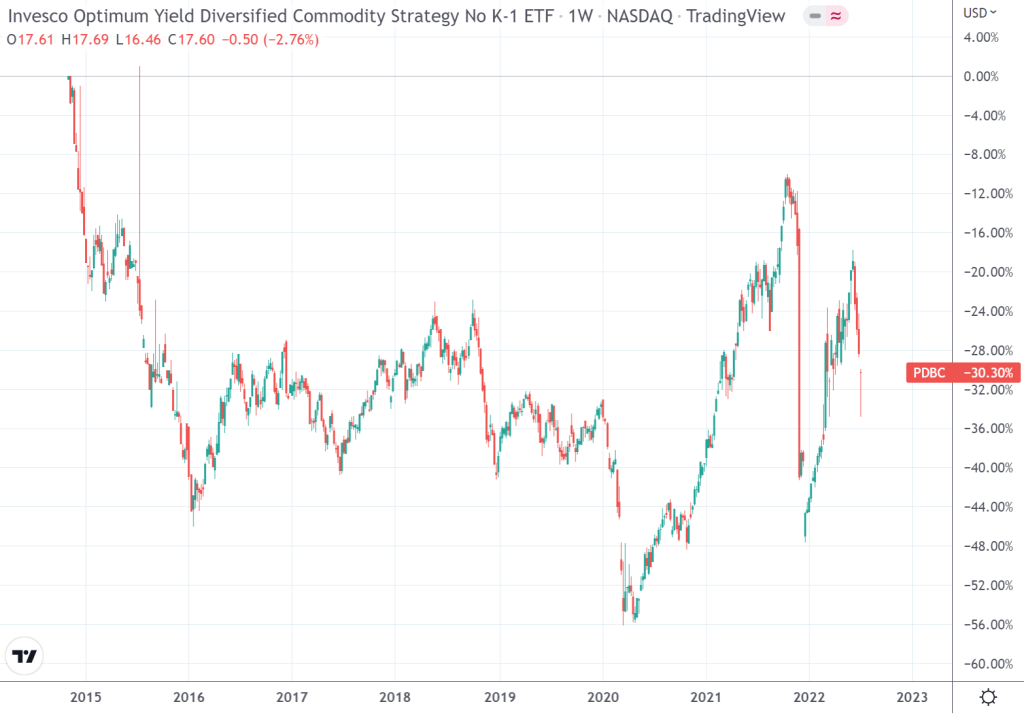

Performance of FTGC and PDBC over the last 10 years
While seemingly commodities may help to cushion the fall in U.S. equities at this moment, in the long run, it doesn’t serve you well. As an investor, expected returns is an important consideration other than attempting to minimize volatility.
Commodities do not offer us a consistent risk premium to warrant a place in our portfolio. Commodities are just as volatile as the large cap US stocks. If one is to hold both a portfolio of stocks and commodities, you might be finding that your stocks are the one that will help to cushion the fall in commodities for the large part overtime. The risk-adjusted returns of commodities are pretty dismal compared to stocks.
Still not convinced? Let’s take a look at the other commodity ETFs that are less broad based. For example, oil, which is known as the king of commodities (USO ETF).
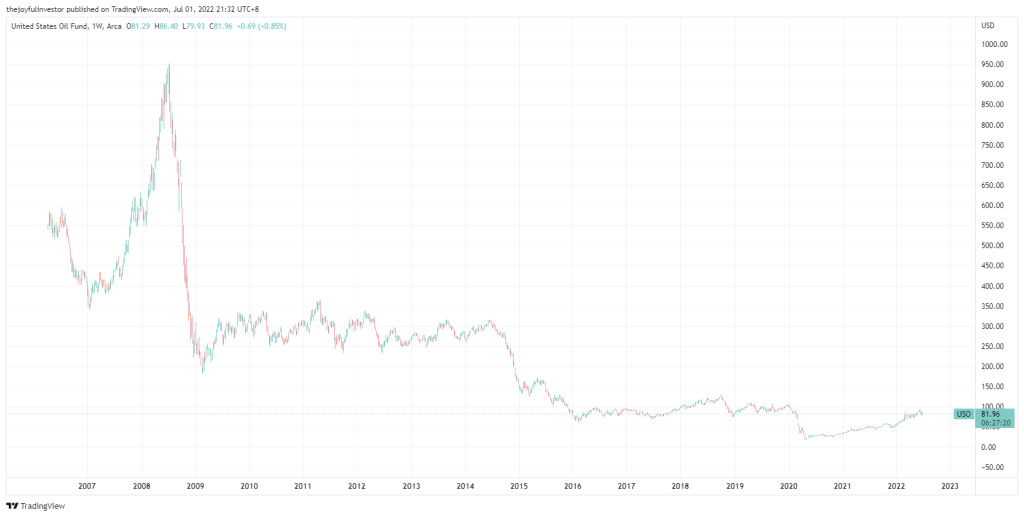

USO ETF historical performance
Or when seeking flight to safety what comes to mind for some investors would be gold isn’t it? Let’s see GLD ETF.
This screenshot looks good of course if you bought gold in 2005. But if you just bought it about 10 years ago, you are barely breaking even, and considering we are on the high side now on this chart.
And we have SLV, silver. Unfortunately it didn’t go back up like gold.
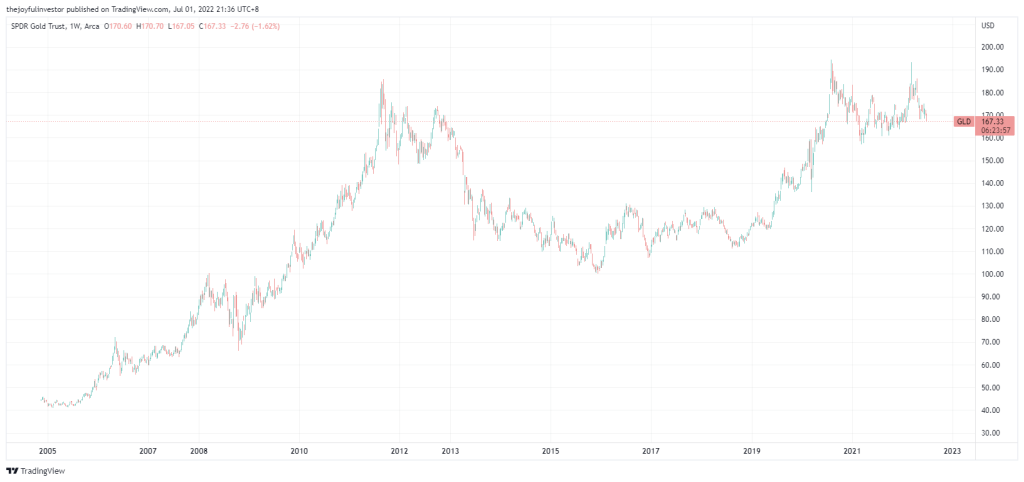

GLD ETF historical performance
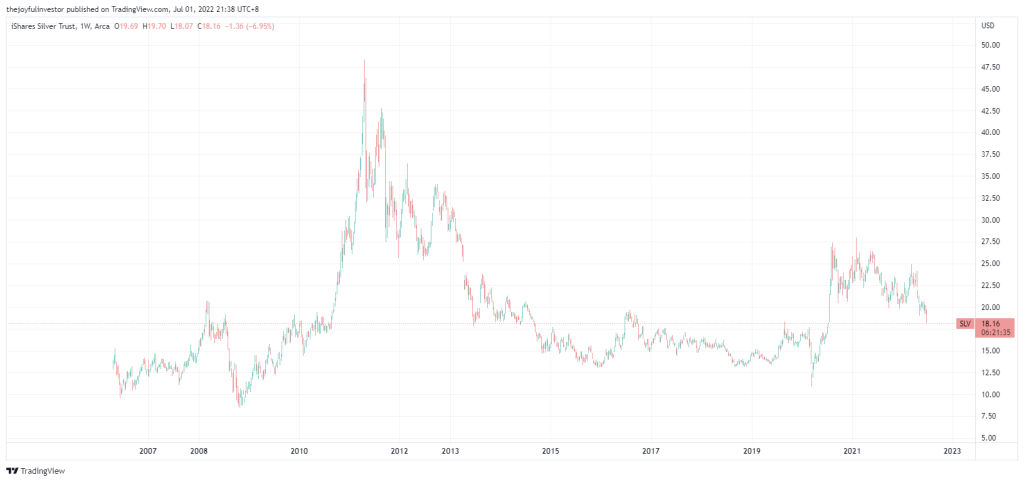

SLV ETF historical performance
Moving on we have WEAT ETF which is a wheat fund. It’s starting to come alive, but would you dare to bet on something that hasn’t been alive the last 10 over years? The same goes for CORN ETF.
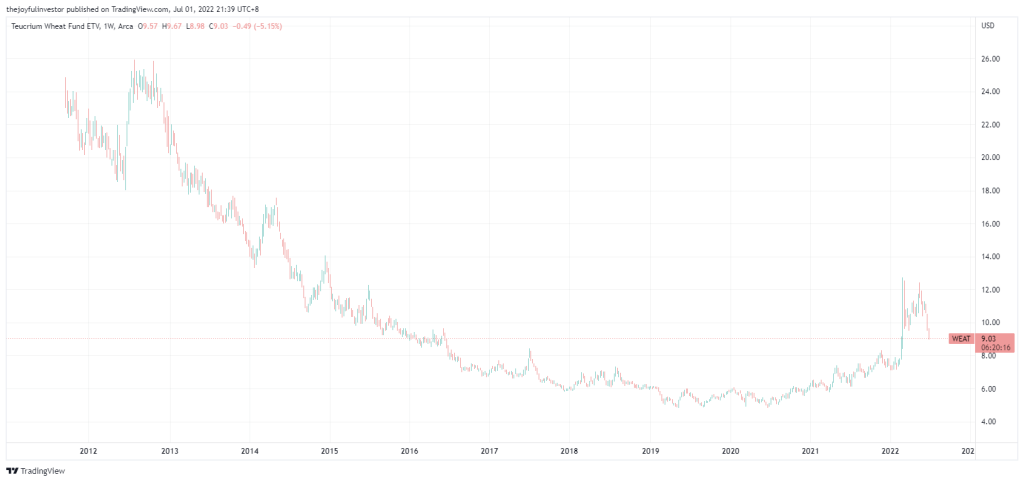

WEAT ETF historical performance
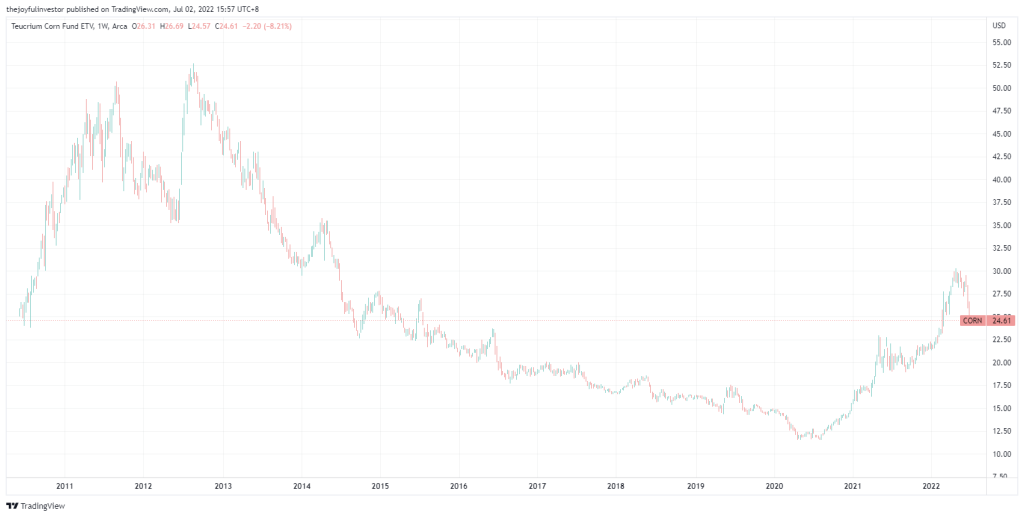

CORN ETF historical performance
3. Commodities do not always move in opposite direction as stocks
The well known opinion that commodities always move in opposite directions as stocks is actually not the complete truth. Historical data has clearly shown that commodities are not always correlated to stocks and bonds.


Periods where there is positive correlation between DBC and SPY
Concluding thoughts
To sum it all up, the common opinion that commodities are negatively correlated to stocks does not always hold true. There is no concrete evidence that there are correlation benefits for the portfolio.
Commodities for the most part, do not offer investors a consistent or reasonable risk premium. At times, commodities in a multi-asset portfolio may indeed reduce the volatility in performance but what is often not mentioned is that it goes both ways. While occasionally it helps to cushion the downside, the majority of the time it caps or negates your upside. And does more harm than good overall if you look at the bigger picture over a longer period of time.
A better way to mitigate risk for most investors is to learn when to hold more cash or for the more initiated, to learn how to use put options to hedge against a falling market which sets a predetermined maximum loss, even if you are wrong.
Lastly, the argument that commodities haven’t been as popular in the past doesn’t really mean that it must be in the future. Many types of ETFs in various industries have sprung up over the last couple of years to attract inflow of funds including the space exploration and innovation sector. It may not necessarily be the case that there is a genuine need or demand for commodities or such ETFs but ETFs as a whole were obviously good for making money, for the ones that created them.
In the financial media these days, things need to really move fast. Most often, investors may be inclined to adopt easily obtainable opinions and buy into things that they have no idea about from articles or videos that they may come across. Unfortunately, there is a lot of misinformation and the sources may have vested interest for the market to go in a particular direction. This also seems to be the case with commodities.
In short, we are not convinced by the investment merits of commodities and that is why we never buy into commodities. Essentially, even in inflationary environments, investors have historically been better off over the long term holding sound equities as opposed to commodities.



About Hazelle
Chief trainer of The Moneyball Investors Playbook program and founder of The Joyful Investors, a financial education firm that seeks to help avid investors learn to invest better and make the journey a joyful one. I graduated with a first class honors in Bachelor of Accountancy from Nanyang Technological University (NTU) and started my auditing career in one of the Big Four. I believe that once we know how to build our wealth sustainably, we can then live our best lives ever.
Important Information
This document is for information only and does not constitute an offer or solicitation nor be construed as a recommendation to buy or sell any of the investments mentioned. Neither The Joyful Investors Pte. Ltd. (“The Joyful Investors”) nor any of its officers or employees accepts any liability whatsoever for any loss arising from any use of this publication or its contents. The views expressed are solely the opinions of the author as of the date of this document and are subject to change based on market and other conditions.
The information provided regarding any individual securities is not intended to be used to form any basis upon which an investment decision is to be made. The information contained in this document, including any data, projections and underlying assumptions are based upon certain assumptions and analysis of information available as at the date of this document and reflects prevailing conditions, all of which are accordingly subject to change at any time without notice and The Joyful Investors is under no obligation to notify you of any of these changes.
· · ·
Have you enjoyed this article? We’d be grateful if you would share this useful content to your friends who may benefit from it as well.




In a bear market, one should be buying more stocks. 😉
If there’s a real recession, commodities will be crushed, like what happened in the last great commodity boom from 2007 to mid-2008.
Plenty of uncles can tell you how they became millionaires in 1 year from stocks like Keppel, Sembcorp, Sembmarine, Olam, Golden Agri, Wilmar. Provided they also sold before Lehman imploded. 🙂
After 14 yrs, commodity etfs are still far below their peaks of mid-2008.
Understanding the bigger picture is important 👍